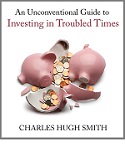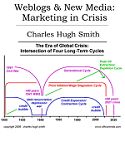

|

|
|||||||||||||
|
Start Your Own Financial Media Channel with This Template (November 16, 2012) This secret template enables everyone to launch their own financial "news" channel. You've probably noticed the cookie-cutter format of most financial media "news": a few key "buzz words" (fiscal cliff, Bush tax cuts, etc.) are inserted into conventional contexts, and this is passed off as either "reporting" or "commentary" depending on the number of pundits sourced. Correspondent Frank M. kindly passed along a template that is "officially deny its existence" secret within the mainstream media. Although we don't present the accompanying algorithm here, it inserts unnamed sources to add veracity, i.e. "Wall Street sources say" or "Capital Hill sources report," etc. With this template, you could launch your own financial media channel, ready to compete with the big boys. Heck, you could hire some cheap overseas labor to make a few Skype calls to "the usual suspects," for-hire academics, hedge fund gurus, etc. and actually attribute the fluff to a real person. Or you could automate the entire process and have a bot contact the pundit via email and solicit the "conventional wisdom" for insertion in the template.
It doesn't take much to tweak this for any occasion or crisis: just modify the
tag generator (for example, by picking the most popular financial phrases on Twitter
in the past 24 hours):
Some analysts, however, caution that lingering headwinds from TAG_003 could endanger a still-fragile recovery. That risk merits continued monitoring, according to TAG_004, chief TAG_005 for TAG_006, adding that while TAG_007 remains subdued, officials can be expected to continue current monetary policies, shoring up prospects for firmer growth in coming quarters. Although improvement in TAG_008 represents a reversal of the trend during the last five months, leading economists are divided over the extent of TAG_009, as the effects of TAG_010 fade. Nevertheless, seasonally adjusted numbers for TAG_011 indicate that the momentum of a key measure, the ratio of TAG_012 to TAG_013, has reached an inflection point, signaling possible future growth in TAG_014. TAG_015 of TAG_016 warns that global cross-currents make forecasting unusually difficult at this time. In particular, the effects of unrest in the Middle East -- effects that would normally drive TAG_017 higher -- run headlong into declining demand for TAG_018, adding to pressures for TAG_019. At the same time, a seemingly intractable eurozone crisis had earlier been accompanied by expectations of distress in TAG_020, an outcome now discounted by sovereign-debt markets, based on yesterday's announcement of new confidence-building measures by TAG_021 of TAG_022 and TAG_023 of TAG_024. In the United States, Federal Reserve chairman Ben Bernanke testified to Congress that, despite any apparent setbacks in the previous quarter, the recovery -- fostered by zero-interest overnight rates for selected financial institutions and bolstered by undisclosed distributions of roughly US$29 trillion in quantitative easing and other forms of support to many of those same institutions -- remains on track. Similar sentiments were echoed by Mario Draghi, head of the European Central Bank, reassuring investors in Europe and elsewhere. A slower pace of regional contractions can now be predicted with some confidence, says TAG_025 of TAG_026. For the global economy, the macroeconomic risks of America's so-called "fiscal cliff" can be mitigated through liquidity injections, either in open-market operations by central banks or in further cuts to the reserve requirements of commercial and investment banks. The Federal Reserve Bank of New York confirms this assessment, noting that all contra-indications of recovery are either transitory, such as TAG_027, or based on statistics that have yet to be corrected retroactively. In any case, experts agree that the recovery is set to gain traction going forward, with accommodative releveraging by TAG_028 and accelerated liquidity conditioning by TAG_029 only adding to consumer confidence, as the year-on-year change in the acceleration of uncontraction in TAG_030 offers an incrementally but dramatically better outlook for survey results in the coming periods. Furthermore, new forms of support for rehypothecation of TAG_031 offer additional incentives for investors to shift sidelined cash back into the marketplace. Meanwhile, excess reserves lodged with the Federal Reserve and the European Central Bank continue to TAG_032, as do the nominal sums of derivative instruments -- now valued at TAG_033 -- tracked by the Bank for International Settlements in Basel, Switzerland. The strength of both asset classes in the current quarter provides further evidence of an increasingly robust recovery worldwide. A spokeswoman for the Federal Reserve Bank of St. Louis declined comment for this article, saying that she is not authorized to speak for the bank. In response, TAG_034 surged higher at the close of trading. * * * * *
TAG_000
TAG_001
TAG_002
TAG_003
TAG_004
TAG_005
TAG_006
TAG_007
TAG_008
TAG_009
TAG_010
TAG_011
TAG_012
TAG_013
TAG_014
TAG_015
TAG_016
TAG_017
TAG_018
TAG_019
TAG_020
TAG_021
TAG_022
TAG_023
TAG_024
TAG_025
TAG_026
TAG_027
TAG_028
TAG_029
TAG_030
TAG_031
TAG_032
TAG_033
TAG_034
This "financial news template" spoof was written by Frank M.; thank you, Frank, for a brilliant commentary
on the state of the mainstream financial media. Copy and paste, indeed....
Things are falling apart—that is obvious. But why are they falling
apart? The reasons are complex and global. Our economy and society have structural
problems that cannot be solved by adding debt to debt. We are becoming poorer, not
just from financial over-reach, but from fundamental forces that are not easy to identify
or understand. We will cover the five core reasons why things are falling apart:
 1. Debt and financialization
1. Debt and financialization
2. Crony capitalism and the elimination of accountability 3. Diminishing returns 4. Centralization 5. Technological, financial and demographic changes in our economy Complex systems weakened by diminishing returns collapse under their own weight and are replaced by systems that are simpler, faster and affordable. If we cling to the old ways, our system will disintegrate. If we want sustainable prosperity rather than collapse, we must embrace a new model that is Decentralized, Adaptive, Transparent and Accountable (DATA).
We are not powerless. Not accepting responsibility and being powerless are two sides of
the same coin: once we accept responsibility, we become powerful.
To receive a 30% discount on the print edition: $16.80 (retail $24), follow the link, open a Createspace account and enter discount code B9G5JDXD. (This is the only way I can offer a discount.) 



Please click on a book cover to read sample chapters
NOTE: gifts/contributions are acknowledged in the order received. Your name and email remain confidential and will not be given to any other individual, company or agency.
"This guy is THE leading visionary on reality.
He routinely discusses things which no one else has talked about, yet,
turn out to be quite relevant months later."
Or send him coins, stamps or quatloos via mail--please request P.O. Box address. Subscribers ($5/mo) and contributors of $50 or more this year will receive a weekly email of exclusive (though not necessarily coherent) musings and amusings. At readers' request, there is also a $10/month option. What subscribers are saying about the Musings (Musings samples here): The "unsubscribe" link is for when you find the usual drivel here insufferable.
All content, HTML coding, format design, design elements and images copyright © 2012 Charles Hugh Smith, All rights reserved in all media, unless otherwise credited or noted. I am honored if you link to this essay, or print a copy for your own use.
Terms of Service:
|
Add oftwominds.com |